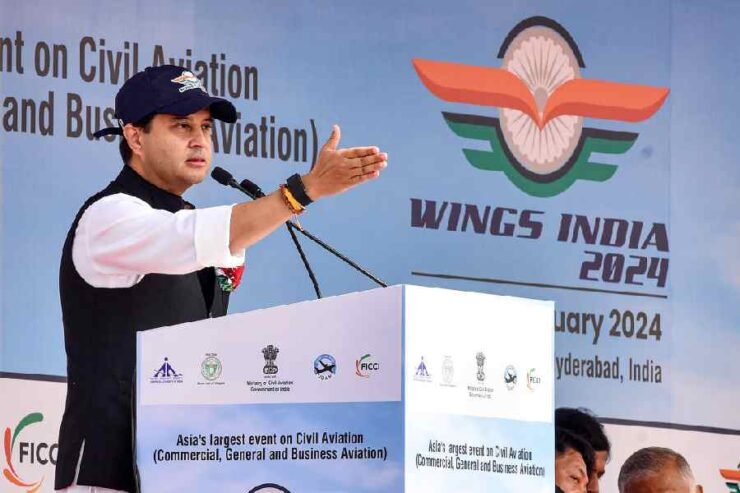
Hyderabad. The four-day aviation summit, Wings India 2024, concluded on Sunday with an impressive turnout of more than 50,000 attendees on the final day. The event billed as Asia’s largest civil aviation event, was hosted at Hyderabad’s Begumpet airport.
Commencing on January 18, the event was inaugurated by Minister of Civil Aviation Jyotiraditya Scindia. The show saw signing of a considerable number of important deals and partnerships, as such the show proved to be a significant event for the Indian civil aviation sector. The first two days of the show also featured roundtables and panel discussions addressing various aviation-related topics.
A major highlight of the show was the static display of 25 aircraft and helicopters along with air and drone shows that appealed to attendees of all ages. The air shows showcased four Sarang helicopters from the Indian Air Force, four aircrafts from the UK’s Mark Jeffries team, and the Air India Express’ Boeing 737 Max 8 executing impressive low fly-bys and intricate manoeuvres.
On the one hand we had aviation giants like the Airbus, Boeing, Rolls Royce, Pratt & Whitney, Bell Helicopters attending the event. But on the other, the show also showcased the impressive progress made by many new Indian startups and beginnings made by other international players with their Indian partners.
In a groundbreaking event for the Indian aviation industry, a Bengaluru based company, launched India’s first-ever aircraft passenger seat at the show. Amitav Chaudhuri, Co-Founder and Director of Timetooth in a statement said, “As of now, 100% of the seats of aircraft owned or operated by India registered air travel companies are imported. Although the business structure allows the airline to decide the sourcing of seats, they had no choice but to import them. Timetooth identified the gap and with the help of DGCA and encouragement from Indian Airline companies, has launched this seat.”
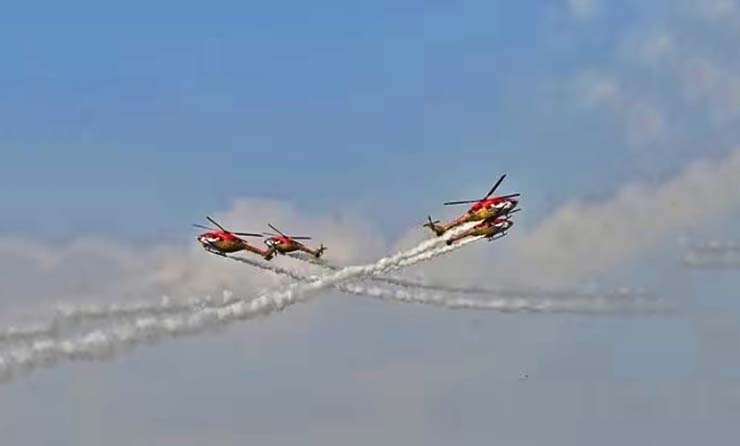
Janhavi Nene, VP Engineering at Timetooth, and the project manager for the seats project, said, “Our team has designed this seat for Performance as per ITSO C39c, while addressing user comfort & efficiency for the operator. Our lightweight seats are currently ready for commuter aircraft like the newly DGCA certified, Hindustan (Dornier) 228. Regional transport aircraft seats with ITSO C127c are already in the pipeline.”
Spicejet, one of the leading Indian airlines, expressed its interest in procurement of state-of-the-art seating systems from Timetooth, customised to the Spicejet brand and its user experience vision. Arun Kashyap, COO Spicejet, while signing the letter of intent at the show said, “In light of our expansion and modernisation plan, we are looking forward to aligning with an Indian partner like Timetooth, that mirrors our commitment to safety, comfort and innovation”.
In addition, Epsilon Aerospace Pvt. Ltd. (India), a leading player in aircraft cabin interior and refurbishment signed a MoU with Timetooth, for the manufacture and supply of airworthy seat covers and cushions for the Timetooth seats.
Meanwhile, Akasa Air announced its tie up with Noida International Airport for strategic collaboration. As part of the strategic partnership Akasa Air expects UP to be a significant market for air traffic in India.
Commenting on the development, Praveen Iyer, Co-Founder & Chief Commercial Officer of Akasa Air said, “There is a lot of unfulfilled demand for air travel in the North of India. Akasa Air would like to increase its presence at the newer airports coming up in India.”
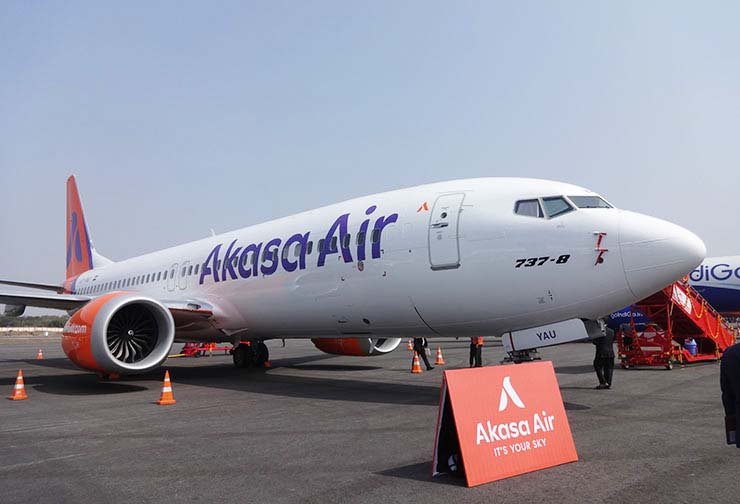
Christoph Schnellmann, Chief Executive Officer at the Noida International Airport said, “Noida International Airport is very excited about the new strategic partnership with Akasa Air. We are at the cusp of bringing the new airport to life and see construction activities accelerate in 2024.”
Michael Neufingerl-Ille, regional sales director of Schiebel Corporation, Austria said that Schiebel has been operating in the aviation sector since 1950. Schiebel was demonstrating its CAMCOPTER® S-100 at the show. It is a medium-range, medium-endurance marvel, designed to tackle all sorts of missions, from surveillance and border patrol to fire control, target designation, damage assessment and even mine detection in marine environments. In addition, the UAS can also handle search and rescue ops, aerial photography, power-grid monitoring and yes, even crowd control using tear gas in civil applications.
The CAMCOPTER® S-100 is equipped with a vertical takeoff and landing (VTOL) system, meaning no need for fancy launch and recovery equipment. Just by pre-programming the GPS waypoints, this UAS is ready fly. It’s all about automation. It is also able to carry a payload of up to 50 kgs, so you can install multiple sensors at different parts of the Camcopter, to collect data, Michael said, which makes it very versatile and efficient.

Indian Navy is in the process of getting these systems as part of initial procurement of tactical UAS. Schiebel Systems India and local firm VEM Technologies are assembling, integrating and testing these VTOL-capable aircraft along with the assembly and integration of payloads in Hyderabad with Schiebel India, besides also progressing ahead on the creation of the MRO facility for maintenance of these systems for the Navy.
Michael described India as a challenging country for its Camcopter, but he effused confidence that as they already have a customer base in 40 countries, with diverse climatic and topographic conditions, so the company is confident that based on its past experience, it will be able to fulfill the challenging demands of the Indian market, too.
Aiming to seize the billion-dollar opportunities presented by the Indian market, Schiebel’s India foray was aligned with India’s transformative journey to achieve Aatmanirbharta in defence right from the beginning. Jajati Mohanty, CEO, Schiebel India, said that Schiebel has started manufacturing the CAMCOPTER® S-100 and its payloads under the Buy (India) category, with up to 60% indigenisation content. The partnership focuses on developing the necessary integration and testing skills for the CAMCOPTER® S-100 in India, establishing a robust ecosystem capable of sustaining the platform for 15 years or more. Schiebel India, along with the production facility in collaboration with VEM Technologies, aims to ensure efficient and effective fulfillment of future customer needs in the Indian subcontinent.
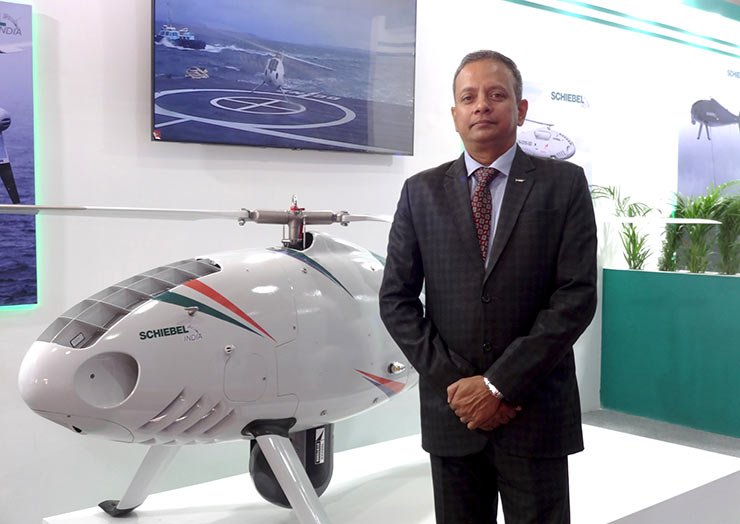
Another new startup at the show was Nalwa Aero Pvt Ltd, which has applied for a patent for developing India’s first 5-seater electric vertical takeoff and landing (eVTOL) aircraft in collaboration with leading international aviation companies.
When commissioned the aircraft will usher in the future of Advanced Air Mobility (AAM) through its optimal fusion of efficiency, versatility, safety and autonomous capabilities.
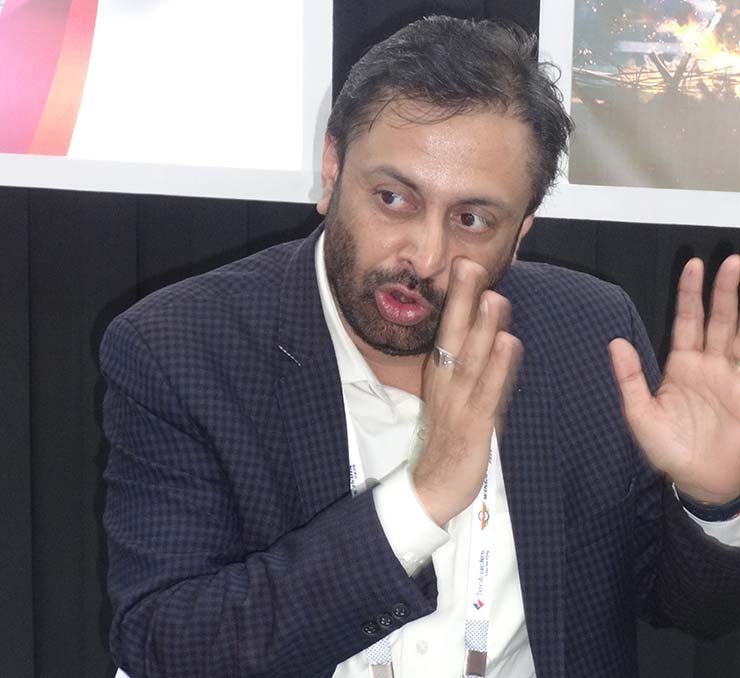
Nalwa’s founder and CEO Kuljeet S Sandhu said that the idea to start a cost-effective, new generation sustainable aircraft germinated during the Covid pandemic, when he was asked by a friend to facilitate air transfer for his ailing father from Ambala to Jalandhar. The incident set him thinking on building a cost effective mode of transport, which could transport passengers and cargo over short distances. His zest led him to design the Nalwa 5X, an eVTOL, which could transport 5 passengers or 780 kgs of cargo over short distances. Examples like these highlight the future of civil aviation in India.At the show, international aviation giant Boeing India conducted the regional finals for the Boeing University Innovation Leadership Development (BUILD) program 2023-24, for participants from T-Hub, India’s largest incubation center. The event, supported by the Ministry of Civil Aviation, India, featured selected startup entrepreneurs and students from T-Hub presenting breakthrough ideas in aerospace and defence, technology, social impact, and sustainability.
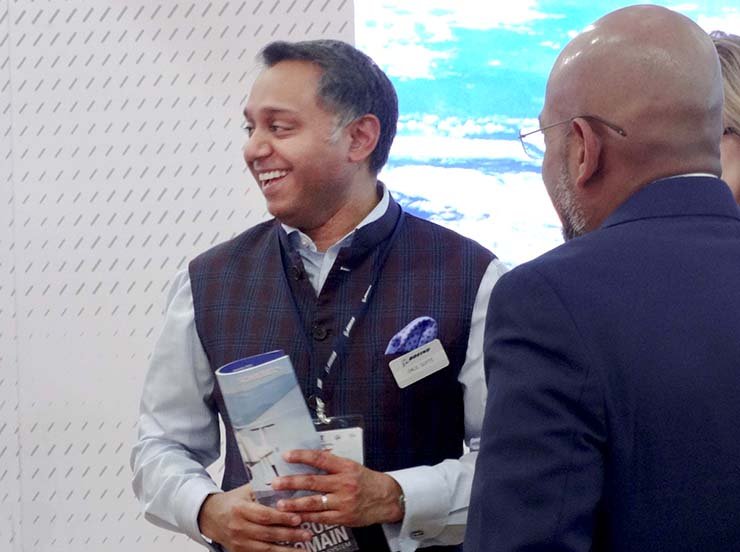
In its third edition, Boeing continues to partner with seven incubators, namely, Society for Innovation and Entrepreneurship – IIT Mumbai, Foundation for Innovation and Technology Transfer – IIT Delhi, Innovation and Entrepreneurship Center – IIT Gandhinagar, Incubation Cell – IIT Madras , Society for Innovation and Development – IISC Bengaluru, T-Hub Hyderabad, and Technology Business Incubator – KIIT Bhubaneshwar, to organise BUILD in India.
Salil Gupte, president, Boeing India, said, “We are deeply grateful to the Ministry of Civil Aviation, India, for their tremendous support in helping provide a platform to nurture innovation and ideas from the thriving startup communities in Telangana and Andhra Pradesh. Boeing remains committed to helping support startup communities in their critical journey from early to maturity stages through strategic industry-academia partnerships and collaborations.”
All in all, Wings India 2024 was able to amply demonstrate the opportunities offered by the Indian civil aviation sector, but in addition it was also instrumental in highlighting the prowess of Indian startups in various verticals of the civil aviation industry. The response of the international players and the keenness exhibited by the Indian companies provided a much needed push required to take India to the next stage of growth in its civil aviation journey.
Happy Flying!















